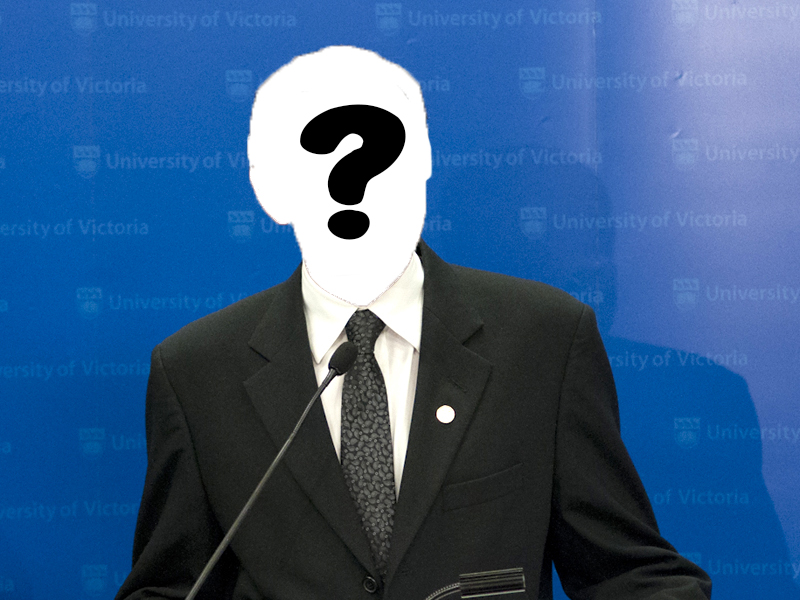Focus on Indigenous candidates and issues, divestment, and transparency are qualities we want in Jamie Cassels’s successor

Dear UVic Presidential Search Committee,
We’ve heard you’ve been asking campus groups to submit letters discussing the qualities they are looking for in the next president of the University of Victoria. While the Martlet wasn’t asked for input, we thought it pertinent to share our views on the matter (and encourage other students of UVic to join us).
First, we’d like Indigenous Canadian candidates to be the first that are considered for the presidency. In closing a decade landmarked by Indigenous resurgence movements such as the Truth and Reconciliation Commission (TRC), #IdleNoMore, and the National Inquiry into Missing and Murdered Indigenous Women and Girls (MMIWG), it is vital that UVic enters the 2020s with reconciliation being a strong priority. To make this commitment, the collaboration of Indigenous administration over a colonial institution would demonstrate a genuine desire for progress and create more opportunities for reconciliation.
UVic has taken steps toward reconciliation. Specifically, the university launched the world’s first Indigenous law degree program, and secured funding for a new national centre for Indigenous law and reconciliation earlier this year.
Without different voices at the top, little should be expected to change.
However, if the university wants to forward that commitment to reconciliation, they would name the first Indigenous president in UVic history next year. Currently, the list of former presidents is exclusively comprised of white men, with no diversity.
By placing an Indigenous candidate, regardless of gender, in the position of president, Indigenous students at UVic would be given an opportunity to see someone with a familiar background in a position of power for the first time in our university’s history.
Without different voices at the top, little should be expected to change.
Second, we ask for a president that values transparency in earnest and a sustainable footprint. This means that divestment from fossil fuel companies and other investments that hinder these goals should be made a priority. The transparency with which we would like to see these changes made should also be applied to all other decisions made under this president’s tenure.
Third, we ask for a president who genuinely and seriously engages with the concerns of students. Given that the president’s duties include “providing overall leadership to the university,” it is hard to imagine having a president who does not engage extensively with the concerns of the university’s largest constituent group. Not only are students by far the largest body directly affected by university governance, we invest a lot of our time and money to be here. Engaging with students is a necessary part of providing representative leadership and furthering the university’s vision.
Engaging with and representing student concerns requires that the next president be accessible to all students. One way they could fulfill this commitment would be having an open-door policy or office hours, which would allow students to approach their president with concerns and their vision for the university.
While the current president has touted an open-door policy to students at orientation, his administration’s relative invisibility on campus is not exactly conducive to direct interaction, nor are his frequent (though understandable) absences from campus for business.
Just this week, students delivering letters to the Michael Williams Building following a divestment protest were barred from entering by Campus Security, who said the students were a “security threat.” After waiting outside for a half hour, the students were allowed to speak with President Jamie Cassels as he left the building on his way to a meeting.
It didn’t always used to be this way. When Former UVic President Howard Petch came to UVic in a time of turmoil, one of his first acts was to invite the Editor-in-Chief of the Martlet to lunch. Petch said he wanted to be the Martlet’s best source of information in the president’s office, and promises to take their calls and questions or explain why he could not answer. They had many conversations after that, and Petch even had his availability for meeting with students published in the Martlet.
Now, we’re not asking for the next president to take us out to lunch (although we certainly would not turn down that offer). But we would like the president to have an open, ongoing dialogue with students and student groups on campus, with clear avenues or office hours set aside for these discussions. Most of all, we want them to take our calls or requests for comments so that students can hear from their president directly on issues and situations impacting campus — not just statements issued through Media Relations.
It is worth noting that our requests are not so different from the university’s own stated priorities. In UVic’s oft-cited Strategic Framework, their major goals include reconciliation, sustainability, and fostering an excellent student experience. If the university does indeed share these priorities with us, it shouldn’t be so hard to find a new President who shares them as well.
Sincerely,
The Martlet
All letters to the search committee can be sent to the university secretary’s office (usec@uvic.ca) or to Shay Lynn Sampson, a student on the committee (events@uvss.ca).







